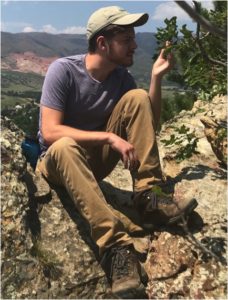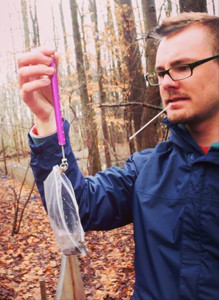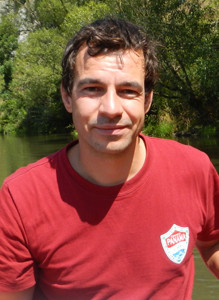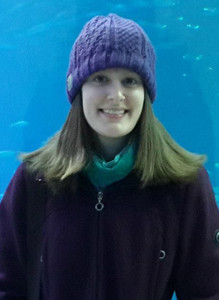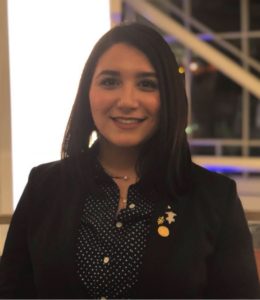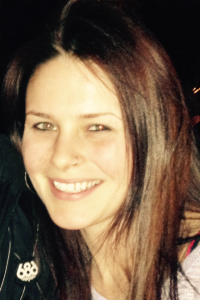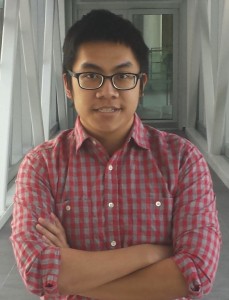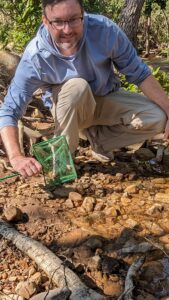 Dr. Doug Woodhams is a disease ecologist working to understand the microbial contribution to immunity and the applications of altering microbiota for conservation and human health. Incorporating over 150 co-authors in over 100 publications testifies to the value he places on collaboration with colleagues and students in the highly interdisciplinary field of disease ecology. Recent studies apply disease mitigation strategies and a culture collection of several thousand host-associated and anti-fungal bacterial and fungal isolates. Current methodology includes immunological chemistry, microbial community culture in a mucosal medium, chemostat and amphibian skin cell-culture development. The lab pursues compassionate conservation research that provides creative alternatives to pathogen exposure experiments, and next-generation sequencing and bioinformatics analysis of microbial diversity and community function.
Dr. Doug Woodhams is a disease ecologist working to understand the microbial contribution to immunity and the applications of altering microbiota for conservation and human health. Incorporating over 150 co-authors in over 100 publications testifies to the value he places on collaboration with colleagues and students in the highly interdisciplinary field of disease ecology. Recent studies apply disease mitigation strategies and a culture collection of several thousand host-associated and anti-fungal bacterial and fungal isolates. Current methodology includes immunological chemistry, microbial community culture in a mucosal medium, chemostat and amphibian skin cell-culture development. The lab pursues compassionate conservation research that provides creative alternatives to pathogen exposure experiments, and next-generation sequencing and bioinformatics analysis of microbial diversity and community function. Education and Appointments | Publications | Photo Gallery | Contact
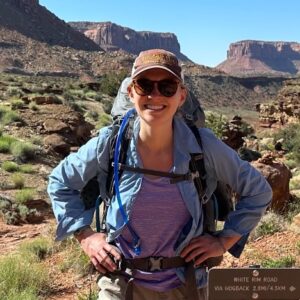
Dr. Maggie Doolin joined the lab in Fall 2024 as an NSF postdoctoral fellow. She is investigating the antifungal functions that the amphibian skin microbiome uses to fight chytrid disease in natural habitats. Her PhD focused on the interactions of parasitic worms and the rodent gut microbiome, and during her Master’s she studied the naming and species relationships of fish parasites. Maggie enjoys using her broad training to research disease interactions, teach about ecological and organismal biology, and mentor undergraduate and graduate students on their own educational journeys. Outside of her work, she also enjoys exploring local outdoor spaces, eating new foods, and snowboarding.
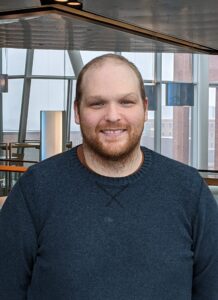 Dr. Patrick Kearns works broadly on microbial ecology. Patrick is primarily interested in the function of microbial communities and how traits contribute to host health and disease susceptibility. Currently, Patrick is an assistant professor of research working in the Woodhams lab primarily focused on the RIBBiTR project. Prior to joining the Woodhams lab, Patrick was an assistant professor at Fisher College in Boston and focused primarily on soil microbiomes and plant-microbe interactions.
Dr. Patrick Kearns works broadly on microbial ecology. Patrick is primarily interested in the function of microbial communities and how traits contribute to host health and disease susceptibility. Currently, Patrick is an assistant professor of research working in the Woodhams lab primarily focused on the RIBBiTR project. Prior to joining the Woodhams lab, Patrick was an assistant professor at Fisher College in Boston and focused primarily on soil microbiomes and plant-microbe interactions.
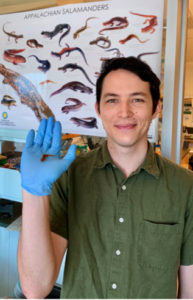
Ross Whetstone is a Ph.D. student interested host susceptibility to B. salamandrivorans and the role that the microbiome plays in disease dynamics. His project is to examine larval amphibians for susceptibility to Bsal, and to test potential probiotics for non-target effects and efficacy in inhibiting Bsal infection in eastern newts. Ross aims to continue researching amphibian disease ecology and conservation.
Brady Inman joined the Woodhams lab after completing his Master’s degree at Middle Tennessee State University. His Master’s research determined the prevalence of Bd infection in amphibians of middle Tennessee and the influence of climate on Bd prevalence in the area. Broadly, his research interests involve further understanding how amphibian life histories and the environment interact to influence Bd infection.
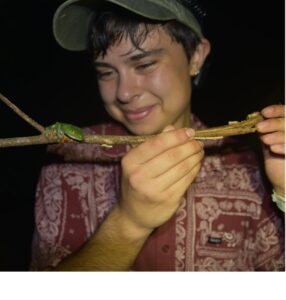 Nina McDonnell graduated from the University of Vermont in 2019 with a B.S. in Natural Resource Ecology and has since been pursuing a Ph.D. in Environmental Biology. His scientific interests include disease ecology, biological resilience, and strategies for maintaining symbioses that support organism health. His research aims to improve ecologically based management approaches for amphibian chytridiomycosis. Outside of the laboratory, Nina enjoys art and is passionate about using visual scientific communication to engage broad audiences.
Nina McDonnell graduated from the University of Vermont in 2019 with a B.S. in Natural Resource Ecology and has since been pursuing a Ph.D. in Environmental Biology. His scientific interests include disease ecology, biological resilience, and strategies for maintaining symbioses that support organism health. His research aims to improve ecologically based management approaches for amphibian chytridiomycosis. Outside of the laboratory, Nina enjoys art and is passionate about using visual scientific communication to engage broad audiences.
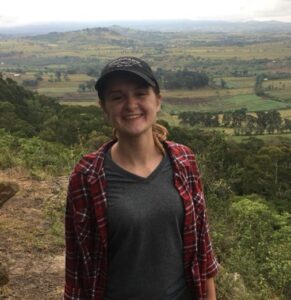 Peyton Haifley joined the Woodhams lab in 2024 after studying and teaching at Colorado State University for several years. With a bachelor’s degree in Zoology and a Professional Science Masters in Natural Sciences, Peyton will utilize skills from these past experiences towards earning her PhD in Environmental Biology. Her research interests broadly include conservation medicine and disease ecology with her PhD research focusing on how water pollutants impact amphibian skin microbiomes composition, overall influencing their susceptibility to Chytridiomycosis. In addition to conservation, Peyton is also passionate about inclusivity in science, science communication, conservation education, and nonprofit initiatives.
Peyton Haifley joined the Woodhams lab in 2024 after studying and teaching at Colorado State University for several years. With a bachelor’s degree in Zoology and a Professional Science Masters in Natural Sciences, Peyton will utilize skills from these past experiences towards earning her PhD in Environmental Biology. Her research interests broadly include conservation medicine and disease ecology with her PhD research focusing on how water pollutants impact amphibian skin microbiomes composition, overall influencing their susceptibility to Chytridiomycosis. In addition to conservation, Peyton is also passionate about inclusivity in science, science communication, conservation education, and nonprofit initiatives.

Kaitlyn Williams is a UMass Boston Alumni with a bachelor’s degree in biology and previous research in biophysics, studying how synthetic nanoparticles can be used in light therapy for cancer. She is creating an artificial mucus medium that replicates the physical and chemical characteristics of amphibian skin mucus as a Ph.D student in the Integrative Biosciences program. Her post-baccalauereate training in the Woodhams lab was supported by a RIBBiTR PEP grant: Developing methods to use amphibian mucus media and skin cell culture to test microbiome resilience.
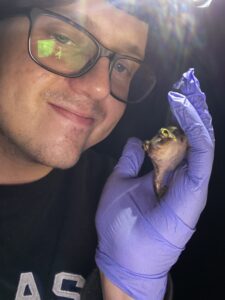
Alexander Richards joined the lab in the summer of 2023 after finishing his biology major at UMass Boston. As a Ph.D. student, he is currently studying disease dynamics of Eastern Spadefoot toads and cohabiting amphibians on Cape Cod and Nantucket. He is interested in contributing to the conservation efforts of amphibians. He hopes to continue working with threatened amphibians of Massachusetts, and conducting research in Mexico near his home state.
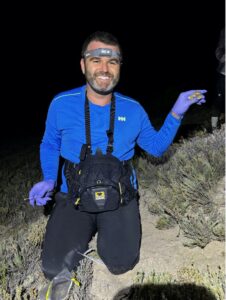
Dan Callahan is a Master’s student studying treatments for amphibian diseases, particularly chytridiomycosis. He has spent several years working for various governmental conservation organizations and hopes that his research can have real world applications to conserve imperiled species.
Former Lab Members
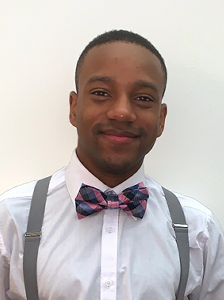
Jaimy Jabon was a returning UMB Biology Alumni as a Master’s student for Fall 2020. He was a Ronald E. McNair Scholar studying the effects of temperature on the mosquito species Culex quinquefasciatus. He decided to continue his research on mosquitoes as a graduate student with a study on the relationship between amphibian-biting mosquitoes and amphibians, with a focus in the potential spread of chytrid fungus between amphibian hosts.
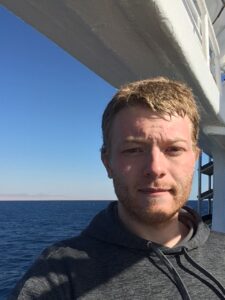
Dr. Joe Madison works on various aspects of microbial ecology and evolution. He completed an NSF Postdoctoral Research Fellow based in the Woodhams Lab leveraging amphibian museum collections to understand multi-generational dynamics of host-microbe ecology and evolution in relation t
o changing land-use and land-cover. Joe also has an ongoing and necessarily related project in the philosophy of science and biology. This project primarily aims to formalize anarchistic and contextualist epistemologies within a biological framework. Such work underlies a developing critique of genetic determinism, teleology, and realism within contemporary strands of microbiological thought. These critiques have the ability to deeply inform experiment and theory, opening a new window to how microbial communities are conceptualized in relation to each other and their environments.
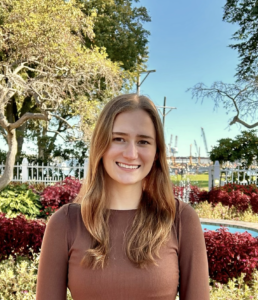
Julia MacDonald is an undergraduate Biology major who joined the lab in the fall of 2022. In collaboration with other members of the Woodhams lab, her research is investigating how light cycles affect metabolite production and antifungal activity of symbiotic bacteria isolated from the skin mucus of amphibians. Additionally, Julia is attempting to encourage tetrodotoxin production in bacterial isolates from eastern newts by varying their growth conditions. Julia hopes this research will inform future practices for culturing symbiotic bacteria from amphibians in a lab setting.
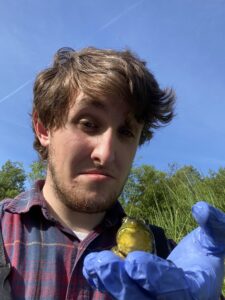 Victor Quadros is an undergraduate Biology major who joined the lab in the spring of 2022. He works with colleagues within the Woodhams lab and within the Romero lab at Tufts University to investigate the role stress plays in modulating disease responses and outcomes. Victor hopes to characterize physiological mechanisms behind altered disease outcomes within and between species with the hope of informing future conservation and research efforts.
Victor Quadros is an undergraduate Biology major who joined the lab in the spring of 2022. He works with colleagues within the Woodhams lab and within the Romero lab at Tufts University to investigate the role stress plays in modulating disease responses and outcomes. Victor hopes to characterize physiological mechanisms behind altered disease outcomes within and between species with the hope of informing future conservation and research efforts.
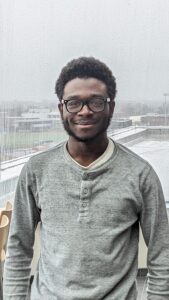
Fedrick Blemur
Fedrick Blemur graduated from UMass Boston with a biology degree and is looking to further his studies with a masters in public health. His independent research involved relating amphibian susceptibility to pathogenic fungus using galactose skin concentration. His experiences in the lab have helped him to succeed as a first-generation student.
Brandon LaBumbard joined the Woodhams lab at UMASS Boston after completing his master’s degree from Southern Illinois University Carbondale. His master’s research compared the current distribution and disease status of the chytrid fungus, Bd, in the Kosñipata Valley of Peru to records before amphibian declines. He is interested in factors that allow Bd to persist in the environment and how community effects aid in the transmission of Bd. His Ph.D. focused on Host-Pathogen Interactions in a Changing World: Microbes, Mucosal Defenses, and Multiple Hosts. Currently, Brandon is employed at the biotech company Arcaea in Boston, MA.
Brandon LaBumbard’s Photo Gallery | Contact
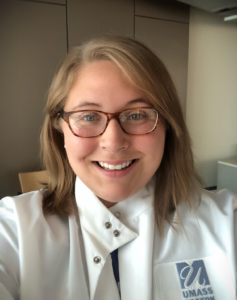
Dr. Amanda Tokash-Peters successfully defended her PhD thesis entitled “Mosquito Microbiomes: Understanding the Interface Between Microbiome, Environment, and Human Pathogens“, and went directly to an assistant professor position at Centenary University. She specializes in understanding mosquito microbiomes, pathogen transmission, and environmental influences on this complex system. Amanda is an affiliate researcher with the University of Rwanda’s Center of Excellence in Biodiversity and Natural Resource Management and studies mosquito microbiomes within and beyond East Africa. She is also an NSF IGERT Fellow in the Coasts and Communities Program at UMass Boston and seeks to find transdisciplinary solutions to complex problems in disease ecology.
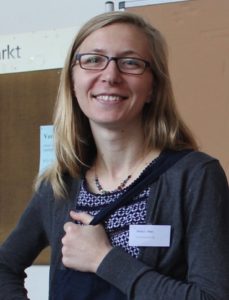
Dr. Molly Bletz has research interests that lie at the intersection of microbial ecology, disease ecology and conservation. Her studies have taken her from the US to Panama, from Germany to Madagascar, to investigate disease dynamics, host susceptibility, the ecology of host-associated microbiota, and disease mitigation strategies. Her PhD work focused on understanding the structure and function of amphibian microbial communities. She joined the Woodhams lab as a David H. Smith Conservation Fellow where she investigated the threat posed by the emerging salamander pathogen, Bsal, and developed disease management strategies. She is interested in understanding the role of the amphibian microbiome in protection against pathogens. Dr. Bletz went on to pursue postdoctoral research at UMass Amherst with the USGS working on conservation decision science, and is now an Assistant Professor at Penn State University.
Website | Molly Bletz’ Photo Gallery | Contact
Dr. Andreas Hertz has been working on taxonomy and systematics of Neotropical herpetofauna for many years. He has been involved in several new species descriptions of amphibians and reptiles, primarily from Panama. One current research direction includes examining recovering amphibian populations that have survived mass extinction through chytridiomycosis. This research focuses on the mechanisms of host adaption in recovering frog populations permitting coexistence with the pathogen. He was supported by a German DFG postdoctoral award, and is now employed in Germany.
Publications | Andreas Hertz’ Photo Gallery | Contact
Kelly Barnhart was awarded the Biology graduate research thesis award upon completion of her Master’s degree focused on, “From Symbionts to Pathogens: Interactions within the Amphibian Skin Mucosome”. She published a first author of a paper Bufadienolide compounds from toad skin, and two chapters on spotted salamander resistance to B. salamandrivorans are forthcoming. Her research interests include disease and conservation ecology, specifically chytridiomycosis and effective treatment methods for this disease. Currently, she is working as a Biomedical Life Scientist with Leidos in Maryland.
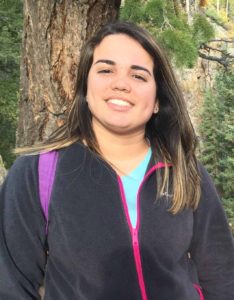
Aura Y. Muñiz Torres completed her undergraduate degree at the University of Puerto Rico in Mayagüez, where she did research on field ecology working with endemic amphibian and reptiles. She completed her Master’s thesis in the Woodhams lab on the interaction of peptides and microbiome and non-lethal coexistence between the anuran host and the amphibian chytrid fungus Batrachochytrium dendrobatidis. Her research goals are to try to understand how different environmental conditions could influence the amphibian skin microbiome to coexist with Bd in temperate and tropical climates. Currently, Aura is a Ph.D. student in the Searle lab at Purdue University.
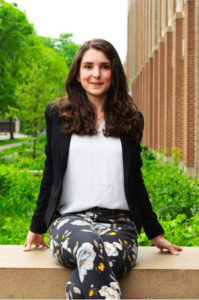
Julia McCartney completed a B.S. in Biochemistry at North Central College in Illinois and then wrote her Master’s thesis in the Woodhams lab on the immune responses of newts upon repeat exposure to Bsal. Her previous research investigated how bacteria, isolated from Lithobates catesbeianus eggs, contributed to water mold resistance and the recovery of the gut microbiome following antibiotic disturbance. Julia is interested in understanding how the microbiome interacts with both hosts and pathogens to protect or augment resistance, specifically in the context of chytridiomycosis. Currently, Julia is employed at GRO Bio.
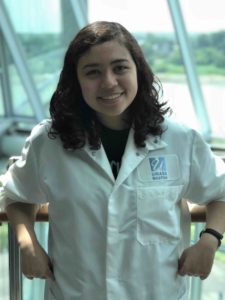 Sydney Horan is an undergraduate Biology major in the Honors college who joined the Woodhams Lab in the summer of 2018. She works with Dr. Molly Bletz on researching the mitigation of Bsal through various methods. Currently, she investigates whether common pets such as Bombina toads are carriers of Bsal through the international pet trade. She is supported by the CSM Undergraduate Research Fellowship (funded by ORACLE), McCone and Alumni Grant, and CSM Undergraduate Research Fund. Broadly, her interests lie in infectious diseases- specifically their relation to genomics and host-microbe interactions. She intends to enroll in graduate school to pursue these interests post-graduation. Recently, part of Sydney’s Honors thesis was published in Herpetological Review.
Sydney Horan is an undergraduate Biology major in the Honors college who joined the Woodhams Lab in the summer of 2018. She works with Dr. Molly Bletz on researching the mitigation of Bsal through various methods. Currently, she investigates whether common pets such as Bombina toads are carriers of Bsal through the international pet trade. She is supported by the CSM Undergraduate Research Fellowship (funded by ORACLE), McCone and Alumni Grant, and CSM Undergraduate Research Fund. Broadly, her interests lie in infectious diseases- specifically their relation to genomics and host-microbe interactions. She intends to enroll in graduate school to pursue these interests post-graduation. Recently, part of Sydney’s Honors thesis was published in Herpetological Review.
Jessica Jawhar is an Honors Biology major on the pre-med track in her senior year. Since September 2018, Jessica has been researching the responses of different strains of chytrid fungi to bacteria. With funding from the Sanofi-Genzyme Research Fellowship, McCone and Biology Alumni Funding, and CSM Undergraduate Research Fellowship (funded by ORACLE), Jessica has determined that some pathogen strains are locally adapted to the bacterial communities of host amphibians.
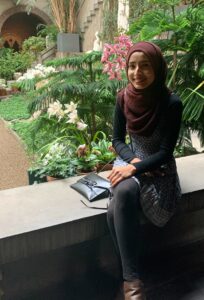
Rakeyah Ahsan is a Biochemistry major who joined Woodhams lab in Fall 2019. Funded by the IMSD, she worked with Ross Whetstone, researching the host-microbiome and its role in inhibiting Bd and Bsal. She is also interested in infectious disease and immunology. After graduation, Rakeyah joined the Kelch lab in the department of Biochemistry and Molecular Biotechnology at the UMass Chane Medical School.
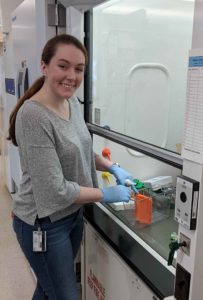
Jenn Boulter was awarded the Excellence in Service Award upon graduation from Biology and the Honors College, with a senior thesis, “The Rusty Crayfish, Orconectes rusticus, as an Alternative Host to Two Amphibian Fungal Pathogens
Honors College Senior Thesis.” Jenn started working in the Woodhams Lab in 2016 where she excelled at several research projects and will be a coauthor on publications. She has been an active member of Phi Delta Epsilon International Medical Fraternity since 2016, and she has served as the secretary and risk management officer (2017) and vice president of programming (2018). She also coordinated the creation of “Stop the Bleed” on campus, an initiative that aims to teach bleeding control and places bleeding control kits in public places. Jenn continues to work as an EMT as she pursues a duel degree in Masters of Public Health and Biomedical Science at Tufts Medical.
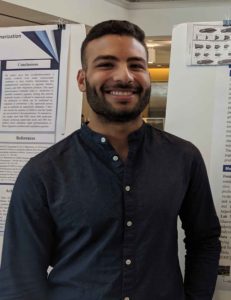 Diego Aparicio graduated from the Honors College after completing a senior thesis, “Effect of Climate Change on the Microbiome and Potential Defense Against Fungal Pathogens in Developing Green Frog, Lithobates clamitans, Tadpoles.” Diego aspires to continue research and pursue medicine.
Diego Aparicio graduated from the Honors College after completing a senior thesis, “Effect of Climate Change on the Microbiome and Potential Defense Against Fungal Pathogens in Developing Green Frog, Lithobates clamitans, Tadpoles.” Diego aspires to continue research and pursue medicine.
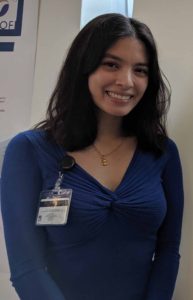
Megan Fung is a recent Honors Biology graduate who worked on the impact of temperature on the presence of a symbiotic bacterium, Wolbachia, in Culex mosquitoes.
Ryan Fanelli is a self-proclaimed mycologist and gourmet mushroom cultivator working on an undergraduate degree in biochemistry at UMass Boston. He joined the Woodhams lab after a research immersion project there in January of 2019 and developing a keen interest in how the microbiome affects disease ecology. After graduating, he plans to apply to graduate school to conduct research that is focused on the importance of fungi and mycology in conservation and sustainable efforts.
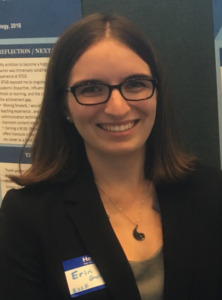
Erin Garrity is an Honors Biology graduate. She completed her thesis project in the Woodhams lab and has received the Beacon Student Success Fellowship and the Sanofi Genzyme Fellowship. She hopes to get her doctorate in veterinary medicine, and continue to foster her interests in infectious disease and ecology.
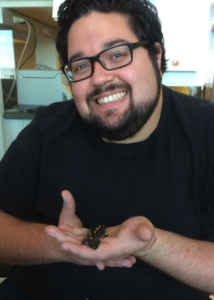
Alberto Campos joins the Woodhams Lab as an undergraduate chemistry student. Alberto is interested in infectious diseases and public health. He is pursuing research focusing on the disease dynamics of fungal pathogens.
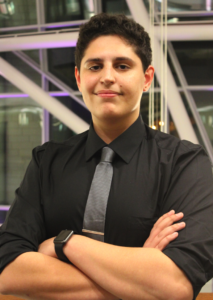
Isam Adam is an undergraduate biology major on the pre-med track in his junior year. Isam has been a member of the Woodhams lab since October 2016, working closely with Brandon LaBumbard on the study of chytrid fungi Bd and Bsal, and different snake and bat fungi. Isam’s work mainly deals with examining the relationship between these fungi and different bacterial strains, and specifically, the volatile organic compounds (VOCs) produced by the bacteria to inhibit fungal growth.
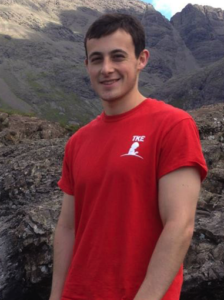
Steve Ganem has been a volunteer lab assistant in the Woodham’s Lab since September 2016. He is currently investigating the impact of certain environmental and biological exposures on the proteolytic activity of Batrachochytrium salamandrivorans. Bsal utilizes an arsenal of proteases to hydrolyze antimicrobial peptides on amphibian skin that serve a vital role in the innate immune system.
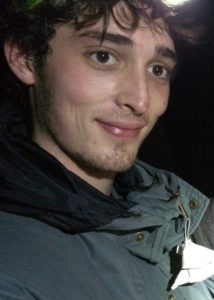
Alex Mertz graduated with a biology degree. As an independent study student he worked on pathogen growth assays, and visited Panama to assist with amphibian sampling in the field. His independent project involved sampling waterfowl and turtles from the New England Wildlife Center in South Weymouth, MA and from wild populations to determine if they can act as reservoirs of Bd or ranavirus and contribute to disease spread.
Kate Seigars graduated from UMass Boston with a Bachelor of Science in Biology. Kate has experience as a research assistant in Analytical Chemistry at Tetraphase Pharmaceuticals and hopes to pursue a graduate degree program in either Dentistry or Pharmaceutical Sciences.
Trong Nguyen accepted a lab manager position at Mass General Hospital after almost 2 years in the Woodhams lab where he studied Batrachochytrium dendrobatidis and other fungal pathogens. He worked on growth and viability assays of fungi upon exposure to amphibian mucus and symbiotic bacteria. His research project focused on antifungal agents against Batrachochytrium dendrobatidis as well as the newly isolated Fusarium solani on amphibians in order to support conservation efforts.
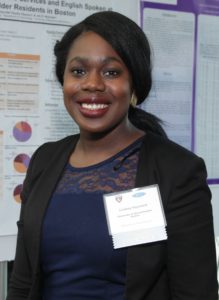
Lindsey Raymond graduated with honors in Biology and is currently working at Brigham and Women’s hospital in Boston. She has a passion for population health research and clinical care. Her project involved investigating the growth of fungal pathogens when in the presence of bacteria.
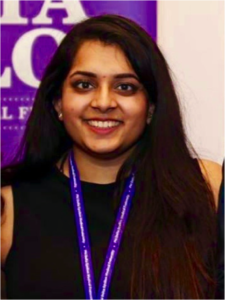
Bhumi Patel joined the Woodhams lab for her senior year at UMass Boston as a Biology major with a Cognitive Science Minor, graduating with honors. With hopes of obtaining an M.D., Bhumi was a Sanofi-Genzyme fellow with a research interest in salamander immune function against the emerging fungal pathogen of salamanders, B. salamandrivorans. She also helped discover that a novel antimicrobial peptide could both inhibit and facilitate different symbiotic skin bacteria from amphibians.
